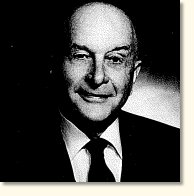 Dr. C. Jelleff Carr, who served as the second Director of the Life Sciences Research Office (LSRO), Federation of American Societies for Experimental Biology died February 15, 2005, as a result of pneumonia. Dr. Carr followed Dr. Wendell Griffith as LSRO Director and led the Office from 1967 to 1977. Under his leadership, the concept of LSRO serving as an external objective source of review and evaluation for various Federal agencies expanded significantly. Initial efforts for the Life Sciences Division of the U.S. Army Research Office were enlarged to include the National Institutes of Health, the Office of Naval Research, the National Aeronautics and Space Administration (NASA), the Food and Drug Administration, and the then U.S. Department of Health, Education, and Welfare.
Dr. C. Jelleff Carr, who served as the second Director of the Life Sciences Research Office (LSRO), Federation of American Societies for Experimental Biology died February 15, 2005, as a result of pneumonia. Dr. Carr followed Dr. Wendell Griffith as LSRO Director and led the Office from 1967 to 1977. Under his leadership, the concept of LSRO serving as an external objective source of review and evaluation for various Federal agencies expanded significantly. Initial efforts for the Life Sciences Division of the U.S. Army Research Office were enlarged to include the National Institutes of Health, the Office of Naval Research, the National Aeronautics and Space Administration (NASA), the Food and Drug Administration, and the then U.S. Department of Health, Education, and Welfare.
A major achievement of the LSRO under Dr. Carr's leadership was the 10 year effort for the Food and Drug Administration reviewing the safety of over 375 Generally Recognized as Safe (GRAS) food ingredients. He organized the Select Committee on GRAS Substances (SCOGS) that met almost monthly for 10 years and produced over 140 reports on GRAS substances safety. In addition, he led other evaluation studies including a series of physiological effects of space flight for NASA, as well as developing reports on research recommendations for various Federal agencies such as A study of new methods of measuring cerebral circulation for NIH, A review of adverse biomedical effects of sound in the military environment, The role of the clinical pharmacologist in direct patient care for NIH, and A study of the role of the clinical pharmacologist in direct patient care for the Department of Health, Education, and Welfare.
Dr. Carr had a long and distinguished career prior to his assuming the leadership of LSRO in 1967. He received his undergraduate and graduate education at the University of Maryland, receiving his Ph.D. in 1937. He joined the faculty of the Department of Pharmacology and Experimental Therapeutics at the University of Maryland and rose from Assistant Professor to full Professor in 1955. He was honored as Professor Emeritus in 1991. From 1955 to 1957 he was Chair of the Pharmacology Department of Purdue University. Dr Carr returned to the Baltimore/Washington area in 1955 as Chief of the Psychopharmacology Unit at the NIH National Institute of Mental Health. In 1963, he joined to Life Sciences Division of the Army Research Office, serving five years until he was named Director of LSRO.
During the period 1937 to 1967, Dr. Carr was an active research investigator, mentoring many graduate students and publishing more than 120 scientific papers covering metabolism of novel carbohydrates, mechanisms of action of aliphatic halogenated ethers used as anesthetics, and mechanisms of action of organic nitrates and nitrites. His studies of the halogenated ethers laid the foundation for development of the fluorinated aliphatic ethers as anesthetics and his later work on the effects of nitrates and nitrites on trans-phosphylating enzymes of vascular tissues led to the development of the drug isosorbide dinitrate. During his years as an active research investigator, Dr. Carr, together with Dr. John C. Krantz, wrote three editions of The pharmacologic principles of medical practice: a text book on pharmacology and therapeutics for medical students, physicians, and the members of the professions allied to medicine (1954, 1961 and 1969.
Always intellectually active, in 1996 he published a paper concerning the toxicological significance of DNA adducts with E.R. Nestmann and D.W. Bryant, which concluded that the current technological capabilities for the detection of DNA adducts exceed their biological significance. With Dr. Albert C. Kolbye and others, he helped organize the Food Safety Council and was its Executive Director from 1977 to 1980. He helped to found a scientific journal, Regulatory Toxicology and Pharmacology, and later served as its editor. In addition he continued to provide advice and counsel to numerous scientific organizations while engaged in the above activities.
Dr. Carr had a strong conviction that carried through his entire life as a scientist. That is, peer review on one's work does not mean evaluation be a more erudite group, but rather review by one's colleagues and peers as equals. Despite his many contributions to numerous disciplines of biological and medical sciences, Dr. Carr was always a quiet and humble person who's greatest joy were his family and the success of his students and colleagues. He received numerous awards and honors for his research and scientific achievements, including life membership in several scientific societies, the U.S. Army Meritorious Civilian Award, and being named a Fellow by Edinburgh University and the New York Academy of Sciences.
Dr. Carr resided in Columbia, MD. His wife, Sallie, and his children mourn his passing, as do his many scientific colleagues throughout the U.S. and the world.